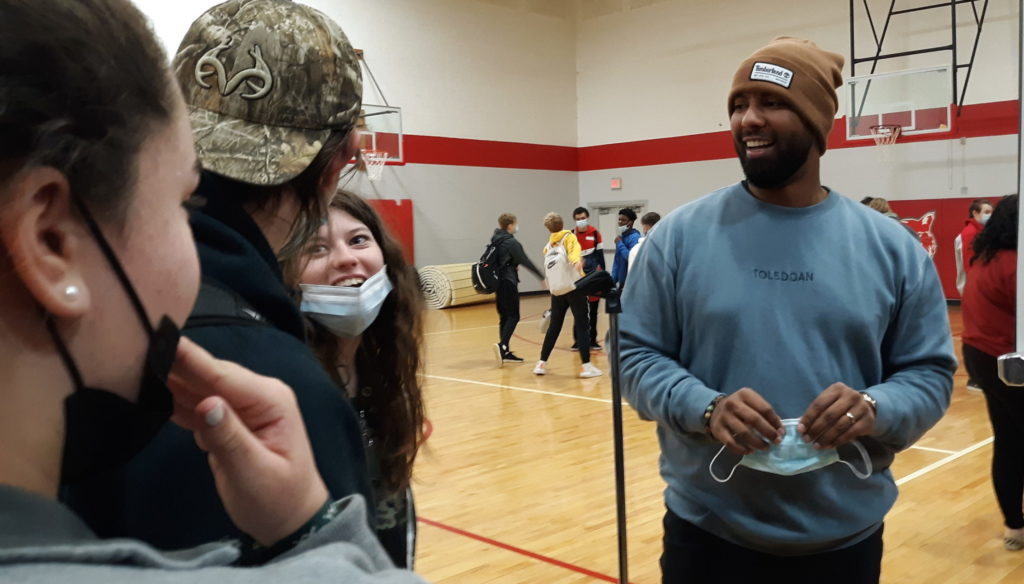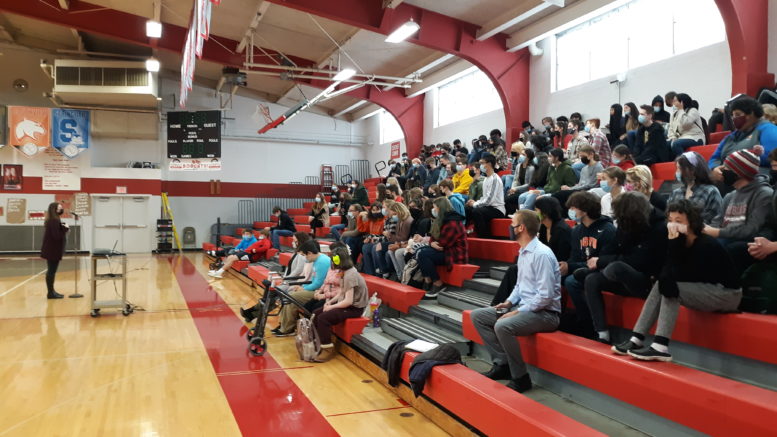By JAN LARSON McLAUGHLIN
BG Independent News
Bowling Green High School students took a break from math, science and literature last week, to spend one day learning about healthy relationships, body image issues, drugs and alcohol, and internet safety.
While teachers get regular professional development days, this was the first time the high school offered a “student professional development day.” A needs assessment survey conducted by the guidance counselors identified issues many of the students are struggling with, said Principal Dan Black.
“It’s things our counselors have seen in our office,” Black said.
So the regular class schedule was scrapped for the day, and the students attended four programs. Following is some of what they learned.
Choices and consequences
Matt Bell was the rock star presenter of the day, with students surrounding him and asking for photos with him after he spoke.
Bell grew up in Walbridge, in similar situations as many of the students he spoke with at BGHS. He was raised in a middle class family by two parents who loved him, he got good grades and excelled in three sports.
Bell was so straight laced that he broke up with his girlfriend in seventh grade after finding out that she smoked a cigarette.
But his life changed his freshman year, when his dad died and he switched to St. Francis High School, where he was no longer the smartest kid or the best athlete.
“I did not make some good choices in my life,” he said, telling the students that there are hundreds of choices they make on a daily basis that have consequences – who they surround themselves with, the words they use, where they go.
That year, Bell started making bad choices, seeking approval from other kids at school.
“If you hang out in a barbershop long enough, you’ll get a haircut,” he said, pausing to make sure the kids understood.
He started smoking, even though he hated it. He started drinking alcohol and using marijuana. The first day he got his driver’s license, he got arrested for drunk driving.
That was enough to make Bell change his ways – for a while. With a 4.0 GPA, he got a full ride academic and athletic scholarship to University of Toledo. He was being scouted by some professional baseball teams, when he injured his shoulder.
Bell was put on percocets. When he could no longer get that prescription drug, he switched over to heroin and soon became addicted.
That began his downward spiral that lasted 10 years. He was arrested 13 times, and is a convicted felon in three states. He spent time in 28 rehab centers, and overdosed three times. He lost the trust of his family.
He hit rock bottom in 2014, when he was homeless and asked his mom if he could stay in her garage during a blizzard. She told him that she would call the police if he entered the garage. With no other options, Bell called the police himself and asked them to take him to treatment.

For the past seven years, Bell has been clean. Five years ago, he started his own “Team Recovery” treatment center in Maumee, which has grown to 18 different locations in Ohio and more than 500 employees – including his mom.
Bell stressed to students that their decisions matter. And he assured them that it is possible to go to a concert, wedding and party without drinking alcohol or doing drugs.
Now is the time to make good decisions, he said, because once someone becomes addicted, they are no longer in charge of their brains.
“It becomes an addiction and it’s no longer a choice,” he said.
Being clean for years, still requires Bell to make the right choices – like attending three AA meetings a week.
Bell also cautioned students about becoming addicted to social media. Stupid stuff they post now can become a free background check for future employers, he said.
Social media addictions have left some youths unable to engage in real conversations, he said.
“You’d be surprised how many people don’t know how to do that.”
And he advised students to avoid social media drama that can hurt people emotionally and physically.
“We make decisions that have permanent results for temporary feelings,” Bell said.
Digital citizenship
With much of their lives being spent online, students were given some tips on how to safely navigate their digital worlds.
Captain Scott Frank, who worked for 11 years as an investigator with the Ohio Internet Crime Against Children program, broke some hard truths to the students.
First, those sexting photos don’t disappear.
“If you think delete means delete, you are absolutely wrong,” he said.
Next, several of them are addicted to their screens.
“Almost all of you have a problem,” he said.
The 7.7 hours a day that the average teen spends online is doing damage. Kids are suffering from anxiety, self image issues, depression, and an inability to create real relationships.
People tend to be cruel online – as evidenced by Frank’s check on the social media accounts of BGHS students. “Some of you are not very kind,” he said.
And people take chances letting strangers into their lives, with 36 BGHS students accepting a friend request from Frank prior to last week’s program.
“Is that a creepy experiment? Absolutely,” he said. “Do I want it to be creepy? Absolutely.”
Frank also told the students that their parents care – even if they don’t know how to talk with their kids about their digital worlds.
“Your parents are truly overwhelmed,” with the teens knowing much more about the internet than their parents, he said.
Healthy relationships
It’s likely that few students thought they would be talking about Spongebob and Patrick last week. But the cartoon friends showed up in conversations about healthy and unhealthy relationships, presented by Annie Miner, who works on domestic and sexual violence prevention at The Cocoon.
The teens talked about the characteristics of healthy friendships, romantic relationships and families – mutual trust, respect, honesty, communication, empathy, compromise, anger control, and individuality.
Then came unhealthy relationships, with the hallmarks being no boundaries, lots of arguing, no trust, lack of communication, controlling behavior, undermining, guilt, and using confidences against someone.
Miner showed images of well-known characters to the teens, and asked them to categorize their relationships as healthy or not. Jim and Pam, from “The Office” were healthy, most of the students agreed.
But Mr. and Mrs. Incredible – not so much.
“Mr. Incredible literally cheats on Mrs. Incredible,” one student said.
“Mrs. Incredible punches him before letting him explain,” another added.
And as for absorbent, yellow and porous Spongebob Squarepants and his pink sidekick Patrick Star, the teens agreed that their friendship is overall healthy – despite some secrets and lack of respect for privacy.
Miner also talked about respect and consent, when it comes to sexual situations. She stressed that consent isn’t truly consent if it is coerced or involves a partner who is impaired at the time.
Consent must be freely given, is reversible, must be informed, enthusiastic and specific to that moment, Miner said.
Body image
Teens are bombarded with internet images of beautiful bodies – making them feel insecure about their changing, not so perfect bodies.
“Everybody struggles with issues about body image,” said Madison Van Alst, of the Toledo Center for Eating Disorders. “The way we see ourselves affects everything in our lives.”
The doctored images online create unrealistic standards of perfection. And teens are very vulnerable when they feel they can’t measure up to those standards.
“It’s really hard to compete with that,” Van Alst said.
That can lead females and males to adopt unhealthy eating habits in an effort to achieve perfection – or something closer to it.
Girls and boys are often subject to teasing, bullying and peer pressure to improve their appearances, she said.
“Being a teenager is hard. Your body is changing,” she said. Puberty can bring on weight gain and complexion imperfections.
Van Alst told the teens they should not fear their mirror.
“It’s important to feel good in all sizes,” she said.
Advertising and social media are creating damage to the self esteem of many youths. According to Van Alst, 42% of first through third graders want to lose weight, and 81% of sophomores and juniors are afraid of being fat. Half of teenage girls skip meals or force vomiting in order to lose weight, she said.
“We aren’t born thinking anything is wrong with us. We are taught that,” Van Alst said.





